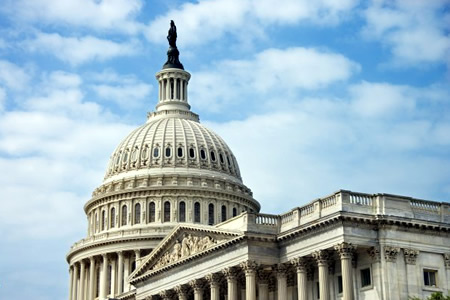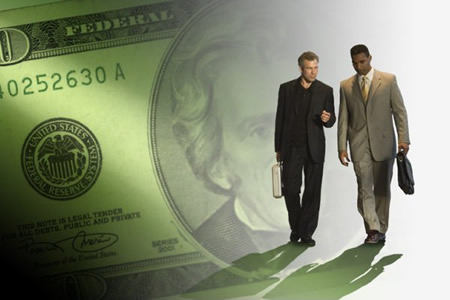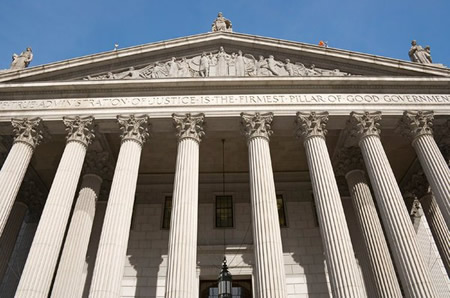« UNCTAD Report: Financial Crisis, Economic Downturn Affecting Companies' Plans For Future Foreign Investment | Main | Paris Motor Show 2008: AutoWeek Editors Announce Editors' Choice Award Winners »
September 29, 2008
U.S. Government Rescue Plan Praised by Franchise Industry

The International Franchise Association (IFA) today applauded the bipartisan economic rescue plan agreed to by congressional leaders and urged both the House and Senate to pass it quickly. The International Franchise Association is the world's oldest and largest organization representing franchising.

"We support the plan as outlined today by negotiators as a critical step in freeing up needed credit to help keep Main Street businesses operating and growing," said IFA Vice President of government relations David French. "Our members commend the extraordinary efforts by leading policymakers over the weekend to bring this important legislation together. The addition of crucial oversight and taxpayer safeguards strengthens the plan, and the package should send a positive signal to the financial markets and bring stability to the U.S financial system."

The franchised business sector is made up of locally owned businesses that create 21 million jobs and contribute $2.3 trillion to the private sector economy. Thousands of IFA members made their views known to congressional leaders this weekend with the message to come together on a bipartisan plan to bring stability to our nation's financial markets.
"We are grateful that our views and the views of thousands of small businesses across the country were heard," French said. "Now, Congress should pass the bill quickly and get it to the President for signing."
• Other Voices:

"Workers will not accept their tax dollars being turned over to the fat cats who took multi-million dollar bonuses and then bankrupted their companies and now threaten our entire economy. Action on the bailout will shape the votes of working Americans in November."
- Anna Burger, Chairperson, Change to Win. [Change to Win, 1900 L Street, NW Suite 900, Washington, DC 20036, USA, is one of the largest organizations of working Americans.]

"This massive bailout is nothing short of a scheme by irresponsible corporate pirates to privatize gains and socialize debt. Such a move will only further add to the burden of individuals and families, who are already struggling to make ends meet. Not one of our tax dollars should go toward rescuing an industry that is failing because of unregulated lending and trading practices.
We are tired of giving golden parachutes to greedy corporate interests. We're standing up and saying, 'Not this time, not with my money and not with my consent'."
- Cindy Sheehan, Candidate for Congress.

"Proposed $700 Billion Bailout Is Too Little, Too Late to End the Debt Crisis; Too Much, Too Soon for the U.S. Bond Market: The proposal before Congress for a $700 billion financial industry bailout will not only fail to end the massive U.S. debt crisis but could actually aggravate the crisis by driving up interest rates.
Based on recently released FDIC and Federal Reserve data, Weiss Research finds that:
1. 1,479 U.S. banks and 158 U.S. thrifts are at risk of failure, with total assets of $3.2 trillion, or 41 times the assets of banks on the FDIC's list of troubled institutions.
2. Among those with $5 billion or more in assets, 61 banks and 25 thrifts are heavily exposed to nonperforming mortgages.
3. The bailouts announced and proposed to date, although expected to cost over $1 trillion, are too small to rescue most institutions at risk, let alone address multiple problems with U.S. interest-bearing debts outstanding of $51 trillion and derivatives held by U.S. banks of $180 trillion.
There should be no illusion that the $700 billion estimate proposed by the Administration will be enough to end the crisis. Nor should there be any false hopes that the market for U.S. government securities can absorb the additional burden of a $700 billion bailout without putting major upward pressure on U.S. interest rates, aggravating the very debt crisis that the government is seeking to alleviate."
- Weiss Research, Inc. [Weiss Research, Inc., 15430 Endeavour Drive, Jupiter, FL 33478, USA.]

"Members of Congress are being asked to come together in a bipartisan effort to deal with an unprecedented financial crisis that threatens the stability of the global economy. For good reason, many are reluctant to take abrupt and dramatic action without giving due consideration to the long-term implications. This caution and thoroughness is appropriate. But it does not diminish the need to take convincing action very soon.
• There will be a time for investigation and the assessment of blame and guilt. This is not it.
• There will be a time to re-balance the powers of the executive and legislative branches of government. This is not it.
• There will be time to ensure government is not intruding unimpeded into the realm of private markets. This is not it.
The objections of lawmakers and many in the public to news of the "bailout" on the grounds of political philosophy and legislative oversight, and pure fear of government growth are legitimate and worthy. But the urgency of the situation -- the possibility of economic chaos and all that would mean -- is also legitimate.
What the economy requires immediately is first aid -- not long-term care. A first responder deals with the "ABCs" -- "airway, breathing and circulation." The same triage is required for the global economy. We are choking on bad debt and in real danger of the complete loss of financial circulation. We have to get the economy breathing again and world markets circulating freely. Then we can deal with everything else.
We do not have the leisure to stand over the victim arguing about who is to blame for the injury or who is going to pay for the treatment. That must come after we know the victim will live."
- Pennsylvania Business Council. [Pennsylvania Business Council, 116 Pine Street, Suite 201, Harrisburg, Pennsylvania 17101, USA.]

"It's fine to hope for the best, but we should budget for the worst. While the intent of this plan is to recoup much, if not all, of the initial cost to taxpayers there are no guarantees. The value of the assets to be purchased is highly uncertain. What we know for certain is that the government will incur a huge upfront cost, immediately adding to the debt and immediately incurring compounding interest payments. All of this will be layered on top of a deficit expected to exceed $500 billion next year, and an overall fiscal policy that is unsustainable. Meanwhile, we are borrowing increasing amounts from abroad to make up for our inability to make crucial budgetary decisions. The answer to every problem in Washington seems to be more debt. That simply cannot go on. Given the uncertainty of the return on this $700 billion of new borrowing, and the daunting challenges already confronting the fiscal outlook, Congress should adjust budget policy either though phased-in spending cuts or tax increases to ensure against any permanent fiscal deterioration.
Washington can normally act in the face of a crisis. We don't need to relearn that lesson. A more fundamental issue is whether we can learn from the current crisis and finally break the pattern of routinely ignoring long festering problems. It is no secret that our nation is entering an unprecedented and permanent demographic transformation to an older society and that we are doing so with steadily rising health care costs and steadily falling national savings. This is a dangerous combination for the future health of the economy. And yet, nothing in the budget process requires Congress to review the current-law outlook beyond the next five years, much less take corrective action. If we learn from Wall Street's mistakes, we can act more effectively, with less pain, and more time to prepare the public for difficult but necessary choices. If we don't change course, the federal government itself will be in need of a bailout."
- Robert L. Bixby, Executive Director, The Concord Coalition. [The Concord Coalition, 1011 Arlington Blvd., Suite 300, Arlington, VA 22209, USA.]

"As you know, about a week and a half ago, the Administration visited Capitol Hill and described the crisis in our financial markets and in our economy. A couple of days later, they presented us with their legislation, and since then we have worked in a bipartisan way to improve that legislation. We've entered into those conversations in the spirit of bipartisanship, with the understanding that each side would have half of our votes to pass the bill.
Today when the legislation came to the floor, the Democratic side more than lived up to its side of the bargain. While the legislation may have failed, the crisis is still with us.
Some of the issues that we worked on with the Republicans to improve the initial legislation related to oversight and protecting the taxpayer as we stabilize the markets. It was about ownership and equity in return for some of the investments that were made. It was about forbearance for homeowners so they could stay in their home. It was about corporate pay and how that had no more golden parachutes, and it was also about, again, oversight, oversight, oversight. I think these were major improvements to the bill, and as I say, they were bipartisan.
Again, the Administration pressed upon us the seriousness of this crisis in terms of the markets. We know how serious this is in terms of the middle class in our country. Whether it's a question of credit for small businesses or homeowners, for protecting savings for people, their penchants for retirement, for the education of their children. Keeping the store on the corner open to service the needs of the people in the neighborhood. America's communities have been feeling the downturn in the economy for a very long time...
The President impressed the Members about the gravity of the situation; that action is necessary to stabilize the markets and to protect the taxpayer.
Clearly, that message has not been received yet by the Republican Caucus. But again, we extend a hand of cooperation to the White House, to the Republicans, so that we can get this issue resolved for the benefit of America's working families, to strengthen our economy, and therefore strengthen our country...
So again, the legislation has failed but the crisis has not gone away. We must work in a bipartisan way, in order to have another bite of the apple, in terms of some legislation."
- Nancy Pelosi, Speaker of the House of Representatives, after the House rejected the Bailout Package 228-205 on Monday, September 29, 2008.

"September 29, 2008
TO THE MEMBERS OF THE UNITED STATES CONGRESS:
The U.S. Chamber of Commerce, the world's largest business federation representing more than three million businesses and organizations of every size, sector, and region, urges Congress to immediately pass the bipartisan financial rescue package to stem the financial panic. Congress must not adjourn without taking action to stabilize the financial markets.
Today's failure to approve legislation addressing the financial crisis has resulted in uncertainty and turmoil that have dramatically affected the markets, and lowered equity prices, eroding individual savings and destroying billions of dollars of household wealth.
Make no mistake: when the aftermath of Congressional inaction becomes clear, Americans will not tolerate those who stood by and let the calamity happen. If, on the other hand, Congress supports a plan to successfully restore the financial system and preserve the flow of credit to the economy, the American people will recognize that act of courage.
The Chamber urges Congress to immediately pass financial rescue legislation. The Chamber will score votes on, or in relation to, this issue in our annual How They Voted scorecard.
Sincerely,
R. Bruce Josten"
- U.S. Chamber of Commerce. [U.S. Chamber of Commerce, 1615 H St NW, Washington DC 20062, USA.]

"Over the last decade, U.S. Chamber of Commerce has spearheaded and accelerated the movement for less corporate accountability and less regulation. During this same time period, there have been major corporate fraud convictions, accounting scandals, and the biggest economic crisis since the Great Depression at a great cost to the American people.
The current financial crisis was caused by U.S. Chamber's aggressive lobbying to eliminate accountability and oversight. Today, U.S. Chamber is the loudest supporter of a $700 billion taxpayer bailout, even though it spent the last decade fighting to eliminate corporate accountability -- one of the major factors that led to the current financial crisis.
U.S. Chamber has been paid millions by large corporations to limit the rights of shareholders, roll back Sarbanes-Oxley reforms, prevent disclosures to investors, and protect boardrooms while preventing consumers from holding them accountable.
U.S. Chamber of Commerce has sought to destroy any check on corporate excess, accountability and greed. By conducting the dirty work of Enron, Exxon, AIG, and a host of other negligent corporations, U.S. Chamber has put countless Americans in financial jeopardy."
- American Association for Justice. [American Association for Justice, 777 6th Street, NW, Washington, DC 20001, USA (formerly known as the Association of Trial Lawyers of America), is the world's largest trial bar.]

"On behalf of our ten member companies representing nearly 80% of the U.S. new car sales market, the Alliance of Automobile Manufacturers strongly urges Congress and the Administration to come together swiftly to stabilize the credit market.
• For many Americans, after their homes, automobiles are the largest purchase they will ever make.
• With more than 90% of all new vehicles financed with credit it is crucial to our industry's survival that consumers have the ability to borrow money.
• This financial crisis not only compromises the vitality of our companies but also, and more importantly, the one in ten Americans whose jobs are supported by the auto industry, including suppliers, dealers and small businesses. Immediate action is imperative.
• We commend the bipartisan leadership of Congress and the Administration for their efforts to craft a compromise and urge Congress to quickly pass, by the end of this week, a financial rescue package that aids both the credit markets and the ability of consumers to finance vehicle purchases."
- Dave McCurdy, President and CEO, Alliance of Automobile Manufacturers. [The Alliance of Automobile Manufacturers is a trade association of 10 car and light truck manufacturers including • BMW Group, • Chrysler LLC, • Ford Motor Company, • General Motors, • Mazda, • Mercedes-Benz USA, • Mitsubishi Motors, • Porsche, • Toyota and • Volkswagen. Formed in 1999, the Alliance serves as a leading advocacy group for the automobile industry on a range of public policy issues.]
|GlobalGiants.com|







Edited & Posted by the Editor | 10:21 PM | Link to this Post









